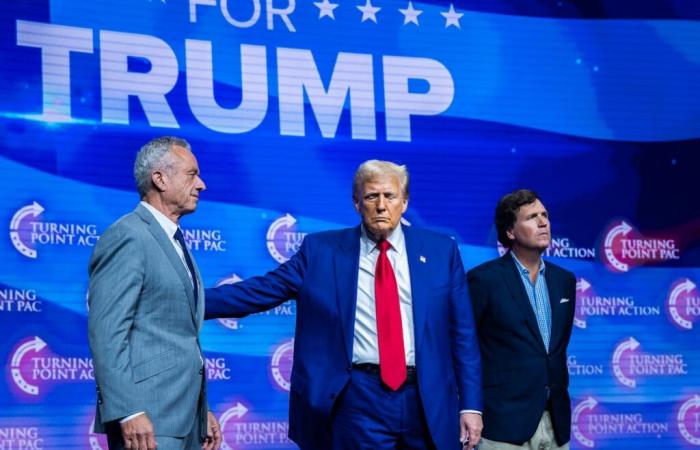“The real danger extends beyond politics to public health,” said Kavita Patel, a physician and professor at Stanford University who has previously advised the Harris campaign. “This rhetoric could erode trust in essential health measures, potentially leaving millions vulnerable if these ideas translate into policy.”
Robert Blendon, a longtime pollster and professor at Harvard School for Public Health, has spent more than 50 years analyzing presidential campaigns. He said he could not recall a closing message on health policy like the “unusual” one that Republicans have offered in the past week.
“Independents favor a much more positive health policy message than being presented here by Republicans,” Blendon wrote in an email. He and other pollsters suggested that the stances could be a strategy to reach skeptical, antiestablishment voters in what is expected to be a close election against Vice President Kamala Harris.
The stances have also forced prominent Republicans to explain why top Trump surrogates are voluntarily attacking popular, ingrained health programs and public health interventions. The Affordable Care Act, which has become widely popular since Trump attempted to repeal it, has been credited for helping tens of millions of Americans gain health coverage since its 2010 passage. More than 90 percent of children born in the United States have been vaccinated against polio and measles, mumps and rubella, helping protect them from severe infectious diseases. Twelve presidential administrations — including Trump’s — have overseen recommendations to add fluoride to water, which has been praised as one of the great public health achievements of the 20th century.
“I’m laughing because I can’t believe that we’re having a conversation about fluoride,” Senator Tim Scott, Republican of South Carolina, said on CNN on Sunday, refusing to weigh in on Kennedy’s comments.
The Trump campaign has repeatedly declined to specify its policy plans, telling The Washington Post in a statement on Saturday that Trump was focused on the election and could not address Kennedy’s remarks on fluoride.
But in an interview with NBC News on Sunday, Trump said he was open to removing fluoride from water.
“I haven’t talked to [Kennedy] about it yet, but it sounds okay to me,” Trump said, according to NBC News. He also declined to rule out banning vaccines.
The late-campaign pivot comes after GOP leaders have also tried to appeal to voters using more conventional messages, such as focusing on the high cost of prescription drugs. Health care ranks as the fourth-most important issue among battleground-state voters behind the economy, inflation, and threats to democracy, according to a recent Washington Post-Schar School poll.
There may be a strategy behind Republicans’ late flurry of antipublic health stances, said Mollyann Brodie, executive vice president at KFF, a nonpartisan health care think tank. She noted that most voters say that issues such as the economy or abortion have influenced their vote — but those voters have probably already decided how to vote, or even cast a vote already.
Meanwhile, there are a number of disengaged voters with more narrow interests, such as frustration and skepticism over coronavirus vaccines, Brodie said. Republicans may be targeting these vaccine skeptics — who tend to be lower-educated, GOP-leaning, and often younger men — with their recent messages questioning public health interventions, Brodie suggested.
“These closing appeals are to get every last ‘undecided’ voter to decide first to actually VOTE on Tuesday and to vote for the Trump/Vance ticket,” Brodie, who oversees KFF’s polling operation, wrote in an email.
But Democrats are also treating Republicans’ recent comments on health policies and public health as a political gift, given that their party typically enjoys more support on health care issues. Harris has a 19-point lead on which candidate voters trust to handle abortion and a 9-point lead on health care costs, two of her strongest issues, according to KFF.
The Harris campaign seized on Johnson’s vow, issued at an event in Pennsylvania, to pursue “massive reform” of the Affordable Care Act – particularly when the House speaker agreed that a goal for early next year would be “no Obamacare.” Democrats said that the comment represented a pledge to repeal the health law.






